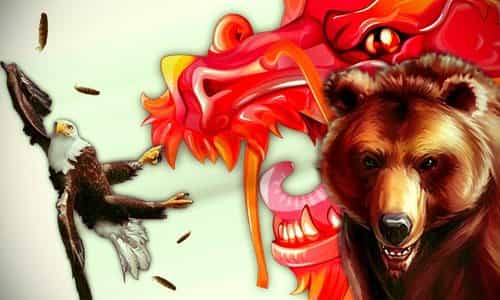Russia-China Alliance Prepares To Take On America
 BY EMILY THOMPSON/ACTIVIST POST AUGUST 09, 2022
BY EMILY THOMPSON/ACTIVIST POST AUGUST 09, 2022Share this article: Share
Share Tweet
Tweet Email
Email Share
Share Print
Print
Michael Hirsh, a senior correspondent at Foreign Policy, writes that with NATO expanding its focus to China, new battle lines are being drawn. Hirsh also believes that today, we are experiencing a new cold war which has already begun and is about to go global. The NATO summit in Madrid is a sign that the global order is indeed changing swiftly.
 Share
Share Tweet
Tweet Email
Email Share
Share Print
PrintChina and Russia have deepened their cooperation in recent years in large part thanks to the US decoupling itself from many regions as it focuses on domestic issues. China's engagement with Russian biotech has increased and in general the Sino-Russian relationship has improved.
Moscow and Beijing have grown increasingly closer, starting with the 2001 Treaty of Friendship up to the most recent agreement between Chinese President Xi Jinping and Russian President Vladimir Putin on the opening day of the Winter Olympics in February. The agreement states that the friendship between the two states "has no limits."
Americans are not pleased with this growing partnership between China and Russia. According to a recent survey by the Pew Research Center, around nine out of ten US adults say they believe it is at least somewhat of a serious problem for the US. A 62% majority say it is a very serious problem. Among other problems, Americans are concerned over China's involvement in US politics, human rights issues in China, and tensions between China and Taiwan.
The Foreign Policy Research Institute published a paper by Carla Jones in which she highlights China's increased investment in Africa, pointing to widespread concern that China may use its strengthening economic power "to extract concessions from that may be economically and politically detrimental to Africa." She also quotes former US Secretary of State John Bolton who derided China's hegemonic ambitions in Africa as predatory and "the strategic use of debt to hold states in Africa captive to Beijing's wishes and demands."
Closer to home, China's naval ambitions are clear. Recently, it launched its third and most advanced aircraft carrier, the Fujian. China is spending heavily on its military and, together with the Fujian, has 17 Type 39A/B submarines, ten Type 055 destroyers, and numerous merchant ferries. This is a worrying development as China's increasing aggression against Japan over territorial disputes in the East China Sea, as well as disputes with a number of Southeast Asian countries in the South China Sea and with Taiwan.
The Center for a New American Security conducted a war game simulation to determine America's response in the event China invades Taiwan. Experts determined that "with Chinese assertiveness rising, U.S. and Taiwanese policymakers need to think through the challenges of responding to a crisis strongly enough to defend their security interests without turning crisis into conflict. By gaming out these challenges, the US and Taiwan can fully grasp the urgency of building an effective deterrence strategy now to help prevent a future Chinese fait accompli."
NATO Secretary-General Jens Stoltenberg, in a speech in November at the NATO-Industry Forum in Rome, Italy, said China already has the second-largest defense budget and will soon have the biggest economy in the world.
"We need to address the rise of China which really is something that is changing the security environment we all are faced with," he said.
Stoltenberg added that China "has the ambition to become the world leader in artificial intelligence by 2030 and to have the most technologically advanced armed forces in the world by 2050... This ambition is not rhetorical - it is very real."
China's failed attempt to rally support behind the Common Development Vision, an agreement which would have linked the Pacific island nations closer to China, proves that not everything is going according to plan. China aims to change the geopolitical status quo in the Pacific and the region's reluctance to align with China is a glaring red flag for the communist country's leadership.
For now, China will focus its ambitions on other areas such as Africa where it hopes to gain leverage and power through its Belt & Road Initiative. In addition, melting sea ice in the Arctic means China may be able to take advantage of the shorter route while avoiding the Russia-controlled Northern Sea Route. This would have a tremendous impact on China's ability to deliver goods more quickly and cheaply so there is a lot of interest in this region of the world as well.
And of course, there is space. China is building its own space station to rival the International Space Station, has built the world's largest radio telescope, and is expected to launch a powerful space telescope next year. Chinese ambitions extend to space and it is a clear signal to the US and other countries that it wants to be viewed as a superpower and taken seriously.
The same Pew poll found that 66% of US adults say China's influence on the world stage has grown stronger in recent years. They also see China's growing power as a threat to the US. Today, 82% of Americans have an unfavorable opinion of China.
In addition, a majority of Americans view the China-Russia relationship as a very serious problem. This, coupled with Russia's war of aggression against Ukraine, has resulted in millions of Americans and Europeans viewing Russia and China as problematic and even dangerous.
But as the US reduces its footprint around the world and leaves governance and military support to others, only China and Russia have the capacity to fill the void; and for this reason, America needs to fight for uni-polarity. A multi-polar world, with China and Russia growing increasingly stronger, is dangerous for all democracies and freedom-loving nations around the world.
Originally published at The Activist Post - reposted with permission.
https://www.prophecynewswatch.com/article.cfm?recent_news_id=5515
No comments:
Post a Comment